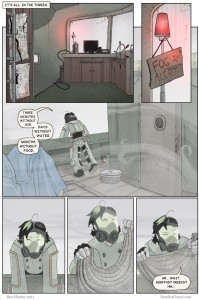Sam Sykes's Blog, page 16
January 3, 2012
Girls Gone Moral
A writer has one responsibility: to tell her or his story.
I want you to keep that in mind as you read the rest of this post, because it's going to be important to the rest of what I'm going to say. I want you to keep that mind open, however, as you read this: an editorial on Adventures in Sci-Fi Publishing as written by Bryan Thomas Schmidt, author of The Worker Prince. And once that's read, I want you to keep in mind the following: I've always been a very big supporter of Adventures in Sci-Fi Publishing and Bryan is a pretty good friend of mine.
But this article is really, really bad.
It didn't really resonate with me from the beginning, since it felt an awful lot like heroes of unapproachable morality and absolute black and whites were more of Bryan's preference and he was recommending that this should just be followed suit without actually explaining why beyond his personal opinions. It wasn't until I reached this particular part that the argument began to grate on me slightly:
In a world where nihilism seems to rule the day, where people question a government's motives for going to war or whether war is moral, where people complain about people judging others, about inqualities, etc., how can it be wrong to write stories which show a clearer sense of morality? What kind of future are we positing for our children? What kind of heroes are we offering them as role models? Don't we have a responsibility to do better?
It wasn't enough to make me mad enough to spray piss, mind you (that's usually reserved for when I watch old episodes of The Shield), but for reasons I'll explain below, this notion that we, as writers, have a responsibility to do "better" is pretty much the summated flaw of Bryan's argument.
That being…what is "better"? Who gets to decide that?
If you ask people this question, you can very rarely do so without Tolkien's name coming up as an appeal to traditionalism. The idea that because Tolkien is as vast and as sweeping as he is means he was somehow more in the right when he wrote the book is fallacious, as is the idea that morality doesn't evolve and become even more faceted throughout time. It suggests that we, as a genre, as writers and as readers, still hold the same mindset that Tolkien did and have a moral obligation not to move past it (hence the problem with moral absolutism: people who argue in favor of it tend to think they are the ones possessed of the "right" morality).
It's absolutely fine to appreciate what Tolkien did. It's great to still look to him for inspiration. But it's not okay to tell his story, his morals, his values. Because that's not your story and you are not fulfilling your soul obligation as a writer. And this is where I start having real problems with the idea of moral absolutism. By agreeing to the idea that there are certain morals that are "true," we are agreeing that there is only one "true" story and all others are false. Fantasy.
Such a notion is treason to both humanity and to literature.
By suggesting we have only one set of morals, we deny ourselves the ability to see anything else. And when you combine the idea of a "true" set of morals with the appeal to tradition, you end up having a rather ominous notion that the only true tales are those told from the perspective of the same person (usually a white heterosexual male). I don't at all think that Bryan is suggesting that the experiences of the white heterosexual male is the true experience, mind, but I do think the combination lends itself a little too easily to the idea.
Bryan brings up the topic of sex, specifically the idea of us being "bombarded" by it as an impurity. There is no topic more complex approached with more frustrating simplicity than sex. A colossal part of our life that shapes us all. I suspect (and only suspect) that people who claim it as a moral impurity tend to believe that not so much emphasis on it should be placed. How do we approach it, then, when we put the emphasis on it ourselves? What do we call a man who wants to keep his daughters safe from boys by placing strict curfews on them? What do we call a woman who has multiple partners? What do we call a teenage boy who, pressured by his friends, wants to get laid at any cost?
The answers:
A protective, judicial father with a stern, unwavering devotion to his family.
A sexually promiscuous woman who is obsessed with the carnal act.
The makings of a pretty hilarious high school movie.
Or:
A guy who catches his daughter kissing a boy and beats her senseless for doing so.
A woman who is trying to find someone she can spend the rest of her life with, physically and emotionally.
A date rapist in the making.
And what of the other people? What of the daughter who rebels against her abusive father to protect her other sisters? What of the guy who loved that girl who didn't want that? What of the teenage boy's companions? What do they say when we ask them the question? What does that daughter's sister say? What does that rejected guy's best friend say? What does that teenage boy's father say?
It's not that we choose to embrace moral complexity, it's that humanity just isn't that simple.
Our responsibility isn't to "do better," and even if it was, you can't do that just by saying "think of the children." One person's story is going to mean a lot more to that girl or that father or that boy based not on a checklist, but whether that story resonates with them. Their experiences are different, their conflicts are different, their troubles are different and we just can't touch them if we're all abiding by the same definition of morality.
But our responsibility isn't to "do better," as I said. Writers are social pioneers, writers are inciters of change, writers are raisers of awareness, writers are powerful. But very few ever choose to be. Most writers choose to use their talent with words to express their own views. Most writers choose to tell their stories. Most writers choose, instead, to write. That's how we touch people. That's how we do better.
We can't abide by moral checklists. We can't keep looking to tradition. We can't not be human. You can say that you can have moral absolutism without cardboard characters, but that won't matter. Because if you can break down humanity to aspects of black and white, no matter how lively they are, they'll still be living in a cardboard world.
Lest I be thought of as picking on Bryan, I agree that there's danger of sliding into a point where we do just use nihilism and appalling acts as a means of shocking people in the name of moral ambiguity. And, to be honest, there are authors who practice it quite frequently and with great skill and I still find it a bit wearing. I like heroes, too. I write about them. I also happen to realize that heroes are human, too. It's not that I don't want to be surprised when I see who wins, it's that I want to know what happened to them to make them heroes.
I want to know about the man who rose from rags to challenge authority and the moral checklist of his day to become the greatest hero of the people and led society to kindness and compassion for all.
Or I want to know how the man who rose from rags out of a need to survive never wanted to challenge authority and did it all for someone else he loved and ultimately sacrificed the war and utopia for someone else.
Or I want to know how he rose from rags to challenge authority and murdered, killed and destroyed in the name of his utopia.
I want to know that story.
Any of them.
So long as it's your story, not someone else's.
January 1, 2012
The Terrible Truth
I was browsing the Something Awful forums this morning and happened to see something that connects pretty well (if indirectly) to what I was discussing in my last post. I can only give credit via their name, but forums user Treguna Mekoides said this of being a writer:
It's sad, because someone misled, either through too much praise or too little oversight, Ms. X and Mr. Y, and they aren't writing for the right reasons. That's sad, because I feel like Mr. Y would get more out of being a shock stand-up comedian or Ms. X would get more out of being a "professional cosplayer" or a Renn Faire wench, instead of both toiling at their desks alone for however long they bother with editing before wanting to hit the "I Get Attention Now" button. For one thing, if you're a bad comedian or a bad wench, at least you get instant, tangible feedback you can't ignore. For another, you can skip all the "hard work" of writing that try-hard schlock and get right to the attention.
Writing has never been "cool." It's sitting alone editing and reediting a scene about hobbits or white elephants or yellow wallpaper while other people you know are having sex or eating good food in happy places. I honestly believe we writers (or copious forum posters) are just a strange group–we have better things to do, but we don't do them, you know? If Ms. X (or any other amateur writer) feels exhausted from one day of editing her own work, if she feels it's a horrible burden and tough and not fun or not even a benefit beyond being able to post online about how she was TOTALLY EDITING HER NOVEL, GUISE then she really needs to find another hobby, because writing will only produce frustration for her, because editing IS writing.
I honestly don't understand where the idea of the "rockstar author" came from. Writers are writers because they're weird. I'd be lying if I didn't cop to the fact that, instead of being a precocious little prodigy with something worth saying, I actually started writing as a kid because of obsessive-compulsive behavior and because leg braces made it very hard to socialize normally so I made shit up and wrote it down. I'd say I matured into a rather normal adult with a weird writing habit, but I certainly didn't take to WRITING IN MY ROOM ALONE ABOUT PEOPLE WHO AREN'T REAL because I had a lot of friends or was happy. It's not normal behavior.
Whatever marketing agent discovered that if you sell the IDEA of writing and selling boatloads of IP to people who actually kinda-sorta liked Language Arts as a teenager was a genius, because the self-help amateur author industry (via "how to publish" and "how to write" books) is BOOMING.
Pretty interesting and pretty accurate, really. It's worth considering what and who you're doing it for.
"Yourself" is the best answer. "Because I have a story to tell" is a good one, too. "Because I don't want to do anything else" is also very good. "Because I want the money" is not great. "Because I want the fame" is pretty bad. "Because I want the ladies/fellas" is probably a strange one.
Happy 2012!
December 29, 2011
I've Had a Few
Sometimes, I wish I had been rejected more.
It was a peculiar thought process that led me to this peculiar thought.
See, I've been busting pieces of my various anatomy to finish The Skybound Sea. It's been going quite well, considering the size and scope of the endeavor (not to say that The Skybound Sea is going to be huger than anything else I've written, but more that I really want to make sure it's the best I've written). But still, before I can perfect it, I have to finish it. Thus, persistence has been taking a front seat in my psyche while the flowery, elegant element of my persona who is responsible for the musing, the humming and the delightful prose (I've since named him Pietrov) goes to quietly nurse a bottle of splieux (a wine I have invented made out of fermented fertilizer; very artsy, it'll make you go blind) in the back.
Thus, I spent three days slogging through a chapter culminating in the end of Denaos' and Asper's arcs. Three days of feelings explored through conflict, bloodshed and a demon wrapped in a statue (because this is a Sam Sykes book). After some time, I began to realize that the chapter wasn't everything I wanted it to be. This was Pietrov stumbling drunkenly into the forefront of my mind as he searched for the bathroom (splieux goes right through him) and I found it easy to push him back and finish the chapter.
But it wasn't so easy to push him out entirely.
And so three days stretched into five, one of which was spent in quiet contemplation that turned to quiet desperation that turned to quiet fear…and then that turned to wine. And that's about the time it hit me. I hated the chapter. I hated the way Asper cowered in it. I hated the way she let Denaos solve everything. I hated the way she trembled before Xhai. And that's when I realized that the chapter was actually all about her, what she was doing, why she couldn't cower, why Denaos couldn't solve this problem.
Five days, in a moment in which I felt largely like an imbecile for not seeing before, were largely wasted.
And I was ecstatic.
Because things were moving in a direction I wanted. Because what I wanted was to do better than each previous iteration. Because I wanted to be great at what I did. And when I realized that five days were wasted, it only occurred to me that five days was what it took. We can talk about persistence and deadlines and how it's a business first and an art second, but that can't be true. The art always finds a way to shine through. The art is always first, especially when it's inconvenient. The art is what counts. Everything else is secondary.
And sometimes, I think if I hadn't been in a mad rush to get published, I might have come upon this idea a little sooner.
Don't get me wrong: I don't at all feel I'm undeserving of where I am, I feel nothing but pride at what I've done, I don't think I'm anything but good. But am I good enough? Will I ever reach that point? Would I have been better if I had been rejected more, if I had taken the time to hone my craft, if I had been tempered by failure before I took a flying leap into whatever I hoped was beyond?
Maybe.
But I don't regret things, so I can only wish in fading moments. And only sometimes.
2012 is coming up and if it doesn't destroy us all (and if Hollywood is to be believed, 2012 will be so awful we will yearn for the days when M. Night Shyamalan was still relevant), we'll be crafting New Year's resolutions. They don't tend to sit well with me, really, because I can't help but think we view resolutions as regrets we choose to acknowledge and, hopefully, improve upon. The fact that we do it in hindsight is what gets me. We look at last year and said: "Well, that sucked, but this time, I'll get it."
Maybe you, as an aspiring author, are thinking the same thing. Maybe your resolution is to get published (because your regret is that you aren't). Maybe your resolution is to be a bestseller (because your regret is that you once said to yourself "this'll never sell"). Maybe your resolution is to handle rejection better (because your regret is that you saw too much of it).
Maybe.
But let me propose to you a new resolution: don't make one. Don't look at something as a regret that you should fix. Don't look at it as wasted time. Don't even look at it, if you can help it. Look at what's there in front of you. When you get rejected, look at what it means to you at that moment. When something doesn't work, look at it so you can figure out how it does. When someone else does well and you don't, look at it for what it is: something that doesn't affect you.
Because I'm almost certain we've all been in the same position as I was: the desire to get published burning inside you, linking your progress to the size of your contracts, thirsting after the idea of fame and fortune and if you happen to have written something good along the way then that's good, too. If you do that, you may reach it. But you may reach it in a way that causes you to look back on it with regret.
Apologize for nothing.
Feel no shame.
Acknowledge that there is no success without failure.
Figure out what it is that you want and then get it in a way that you won't ever have to look back and say: "I wish."
Happy New Year.
December 14, 2011
Link Round-Up
You are probably wondering where I have been for the past week or so! Perhaps you noticed it when you looked outside your window and noticed that there were fewer stars in the sky! Or maybe you just remarked on how colors seemed less bright, food tasted like ash, that sort of thing. My presence has probably been pretty staunchly missed as of late!
Basically, there are two kinds of writers and they inhabit the same body. The first is the one you probably see when you notice me: charming, ruggedly handsome, flirtatious and possessed of a powerful, all-encompassing crockpot of hormones that sends people alight with fear and desire. This is a man that is available only during those times when I am required to be in public.
The rest of the time, I am the slovenly, slobbering creature behind his desk that you are currently reading. My eyes are quite bleary, I am not the best smelling and I am sporting a neckbeard that would make Patrick Stewart sigh deeply and wonder why he's still alive to see this. This is because I am trying my absolutely damnedest to finish this book and this short story by New Year's. It is very difficult, you see, and I am a very lazy man.
But I have returned briefly to share with you some fun links I have discovered because I am that kind of guy. The kind of guy who will walk out on you and then come back with a bouquet of webcomics and hate and tell you to take me back.
FIRST UP.
Maybe you have listened to the Functional Nerds podcast before? You might, if you are indeed a nerd who happens to function. But what you have not done yet is listen to me on it as I gas on about how much I love video games and what kind of a tremendous dork I am. You have not seen that. Also there is some Cherie Priest nerd on it, I guess?
This next link is a blog I've found to be pretty fun, if only having been introduced to one post. Jay Kristoff happened to summarize the depressing irony of mass marketing a movie based on defiance of exploitation pretty well. The rest of his blog is pretty lovely, too. You should probably check it out!
And finally, it's been awhile since I've seen a new webcomic I've wanted to talk about, but hanging out with the goons today showed me this webcomic here.
Derelict, by Ben Fleuter, is a really great webcomic about the apocalypse. Or the post-apocalypse, anyway.
I tend not to like post-apocalyptic stories in general. Mostly because I'm pretty burnt out on zombies and society seems to be having trouble conceiving of an end-of-all-things that does not revolve around the dead rising and us being saved by grim-faced, stoic white men who have relationship problems when the world is over.
Derelict, however, is one of a kind. Amazingly well-paced with a story that lets its atmosphere and style do the talking for it. It manages to capture everything we love about apocalyptic stories–the despair, the fleeting hope, the sheer desire to survive–without falling to its many cliches. I love it and you should, too.
December 9, 2011
Ham-Handed Commentary
So, my good friend Daniel Abraham, author of The Long Price Quartet and The Dragon's Path published this on SFSignal yesterday.
It is a love letter from genre to literature. It is quite sweet. It is quite accurate. But, to me, it is not accurate in tone. Personally, I don't see our relationship as something that would be put down in a love letter. No. Ours is a more visceral relationship, filled with love and hate. The kind that can only be captured by a drunken voicemail left late at night.
And it goes something like this…
Ring.
Ring.
Ring.
"Hi, you've reached Mainstream Literature. I can't come to the phone right now, because I don't own one. Please leave a message after the beep."
BEEP.
"The fuck? That's what you're calling yourself now? Mainstream literature? Like, you're for everyone now? The main? The stream? Like we're all just little salmons swimming along in your stream and everybody can come have a bite of your fresh-ass krill? When the fuck did this happen? Last time we talked, you said you wanted to remain exclusive. You we're all: 'no, no, Genre, we can't do this. I must remain faithful to the spirit of my art.' Like…like that's a thing? Like I don't do…uh…art…'n shit?
"Sorry, I've been, like, jamming mead for the past, like, six hours. Then George came over and he brought a glazed duck and we were all getting fucked up on honey-basted fowl, its delectable juices filling our mouths on tides of ecstasy, only to be smothered again by the crispness of the fresh chestnut salad and finally quenched with another round of the finest honeyed ale and–
"Oh, what? What? Was I describing a feast again? Was I feasting, Literature? Was that too fucking raw for you? Well, fucking GET USED TO IT. That's what I do now. I've got my own fucking friends now, I don't need your shit. I've got amigos and we all roll seven legions deep, fuckin' tossin' back ale and slammin' dragon's blood, yo. What's that? You want to ride with us? FUCK THAT SHIT. THIS WARHORSE HOLDS ONLY ONE FUCKIN' STALLION, BITCH. OH, WHAT, A STALLION CAN'T RIDE A WARHORSE NOW? IN GENRE, IT CAN!
"So yeah, this is me, this is me breaking up with you and tellin' you that you can go–"
MESSAGE LIMIT EXCEEDED.
Ring.
Ring.
Ring.
"Hi, you've reached Mainstream Literature. Sorry, I've been debating how to turn this lemon merengue pie into an analogy for my marriage. Please leave your message after the tone."
BEEP.
"-AND YOUR FUCKING DOG, TOO. FUCKIN' ACTING LIKE IT'S ALL FUCKIN' DEEP AND MEANINGFUL BECAUSE IT FUCKIN' SHIT ON THE LAWN. OH YEAH, I'M SAYIN' SHIT NOW. SHIT, FUCK, PUKE, FART, PISS. YEAH, IT'S FUCKIN' REAL NOW. IT'S ALL THE WAY FUCKIN' REAL. LEPRECHAUNS ARE REAL. DRAGONS ARE REAL. I'M FUCKIN' REAL, BITCH. I'M ALL UP IN YOUR FUCKIN' GRILL WITH MY SPELLS AND MYSTERIES AND SHIT. I'M MOTHERFUCKIN' OSIRIS SLAPPIN' MY SEVERED PHALLUS AROUND AND THE PEOPLE ARE FUCKIN' LOVING IT. LOVING IT.
"FREESTYLE. FUCKIN' DROP A BEAT, FRODO.
"Pfft-pfft-pfft! Chikka-chikka-yea!
"LISTS! I'M ON 'EM.
"SERIES! I GOT 'EM.
"RATINGS! I'M ALL ABOUT 'EM.
"IT'S GENRE, Y'ALL. FRESH FROM THE PAGES.
"FUCKIN' OFFA THE BOOKSHELVES, MAKIN' KING'S WAGES.
"I AIN'T GOT NO FAERIES, I'M A BIG BOY NOW.
"INCEST AND SHIT AND EATIN' ROAST COW.
"GOT MY BOOKS REAL NICE, MY COVERS ALL SLICK.
"LOOK AT ME, LIT, YOU CAN SU–"
MESSAGE LIMIT EXCEEDED.
Ring.
Ring.
Ring.
"Hi, you've reached Mainstream Literature. I'm currently occupied staring wistfully out at the horizon in a period of deep self-loathing. If you'd like to be involved in this, please get back to me in two years after my research is done."
BEEP.
"Baby.
"Baby.
"What are we doing here. What..what are we doing. Why are we doing this again. We don't need this, right? You don't need to tell your parents. You don't need to tell your friends. We don't need this, right? Yeah, right. Right. We can just let this slide. Yeah, you can just go ahead and delete this and…yeah. Yeah.
"What? You want an apology? Baby, I'm sorry. I'm so sorry. I know I…I know I fucked up. I fucked up real bad. I'm so…it's just that you make me so…so…Oh. Oh God. Oh, fuck. I didn't want this to happen. Shit, look at me, crying and shit. I know you don't like that. I'm sorry, baby. I'm sorry I called you boring. I'm sorry I called your friends boring. I'm sorry I thought the dog was just shitting on the lawn. Baby, I'm sorry. You don't need to tell your parents. Nah, baby. We can still work this out. We can…we can…
"Oh…oh god. Oh no. I'm gonna fuckin' puke. Look, I'll bring chocolates back tomorrow. I'll see you at work, baby. If the security guys don't let me in again, then I'll just leave them at the desk and then come back and wait for your ca–HURK! BLARF! Shit. Shit. Oh, god, baby. Sorry. Sorry!
"Call me!"
END OF MESSAGES.
November 29, 2011
Ozymandias is still a jerk
Chances are, if you're a writer–professional, aspiring, tech, vengeful–you don't need another reason to despair. The economy stinks, publishing is pretty selective, agents are harder to come by, the ice caps are melting and soon polar bears will be moving down into your neighborhood to do the writing jobs and the herring they work for is at a premium. Yes, things can be pretty gloomy.
So you don't really need to read this piece here from an anonymous midlist author expounding on why it can (and frequently does) suck to be an author. You could compare salaries, you could identify with her envy complex with books by other authors, you could sympathize with her lack of jobs and still feel slightly enraged for her bringing this upon you when you didn't need it.
And if you read it, you probably will. I can't say I was immune to the despair that crept over me.
Being an author is sometimes like being back in high school.
No, not in the sense that there are people waiting to stuff you in lockers. I've never been anything but aggressively honest when I say that there has never been a non-supportive author or peer in this industry. Everyone remembers what it's like, everyone remembers how hard it is and everyone wants you to succeed.
Nor in the sense that there are superiors that you privately resent. Your editors definitely are invested in your success and frequently in you as a person. And if I ever called my editors Mr. Spanton or Mr. Anders, they'd probably look at me real weird and then maybe push me down a flight of stairs.
Rather, being an author is occasionally like high school in that you instantly become the same insecure, crackly-voiced soothsayer who divines omens in coincidence, conspiracy in misfortune and crisis in the natural passage of time. Thoughts of "is she prettier than me," "does he think he's bigger than me," "have their pubes come in yet" rather swiftly turns to "does she have foreign-rights deals," "does he think his twitter followers makes him more important," "oh my god, they definitely got pubes now."
I exaggerate.
But not by a lot.
The truth is that writing, especially professional writing, is unnervingly like going through puberty again. You're embarking on something that's entirely new to you. It's slightly less sweaty, of course, but frequently as awkward and often difficult to get by. The chief problem is that, although there's books, classes and talks on the subject, all of them (including this one) will fall short of what you really need because it's different for everyone and the only thing you have to compare against is your peers…for whom it's entirely different.
So, if you're anything like me, you stress yourself out. You cringe when you hear other peoples' good news, no matter how much you might have wished that good news for them. Your neck tenses up when you look at your manuscript and wonder exactly what it is you're doing with it. You panic and run naked in the streets screaming "I'M DOING IT WRONG! I'M DOING IT WRONG!"
Eventually, you pass out. You wake up on the floor of your office. You find your trousers. You sigh and crawl back up and you start writing again.
Because this is pretty much the only universal truth in writing: if you're going to, then you will.
This is the sole constant of writing and the most-often underrated aspect. You will use talent a lot in writing your book, in the initial spark, in the prose, in the narrative and voice. You will use luck once or twice, in things that are largely out of your hands. You will use persistence, perseverance and everything else that implies sitting down and doing it even if you don't feel like it for absolutely everything else.
Because what other people do, what other people experience, what deals they make, what money they get, what followers they have, they're going through the same stuff you are. And if they weren't, it wouldn't matter. Your writing moves the way it does. You can nudge it along, you can try marketing techniques, you can try holding your breath and whistling Dixie if you think it'll make your moustache grow quicker. But the only way to succeed at being a writer is to write, no matter what else happens.
Because no one really knows what's going to happen. You can look to agents and publishers like they know, and they might have a better idea than you do, but ideas is ideas. No one knows what will hit next, when it will hit, why it will hit. No one knows what's going to spend years writing, only to take off suddenly one day. No one knows when you're going to get hair on your body. Certainly not you. I wouldn't advise asking your publishers, either. They'll be weirded out.
Has this helped the despair you may feel? Probably not. Will it ward against the despair you'll feel in the future? I can almost assure you it won't. Did this blog post solve all your problems? Not a chance in hell.
Because, like puberty, it's not a choice for a writer. What else are you going to do? No matter what the others are up to, you've still got to write. Not for the editors, for the money, for the fame. It's just something you're going to do. Because you're a writer.
Duh.
November 23, 2011
Cool Fan Stuff
You might remember Tiffny Gibson from her great entry in the Draw This Dog section of one of my giveaways. She has graciously come to me to inform me that I have some of the coolest fans ever.
Hi Sam. You may remember me from such contest entries as Draw this Dog (I drew the black and white close up with you in the eye).
I am a very crafty person and for some reason I decided to make dolls. I've never made dolls before, not quite sure why I decided to do so now, but it was…different.
I don't know that I'm within the deadline for the giveaway contest, but either way I've been working on these dolls off and on and meant to send you pictures once they were finished. The contest seemed a good impetus to complete them and I have a friend who I think might enjoy your books (since I already own a copy of both books).
As far as the dolls go, I know they are far from perfect, it was a trial and error project. In particular I had some trouble with Denaos. At first I thought his hair was black but in Black Halo it was described as reddish, so hair replacemnt was necessary. In the end it came out very red, but there was only so much I could achieve with the embroidery thread. I attempted Gariath,but the results were…unfortunate. So, I only have five of the group, made with a lot of hot glue and hope.
Anyway, I think I got at least the idea of each character with the dolls. Let me know if you want them, I could mail them to you. Hope you got a lot of awesome contest entries : )
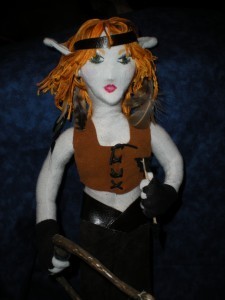
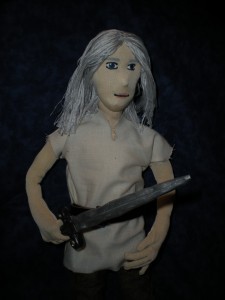

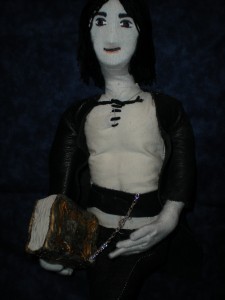

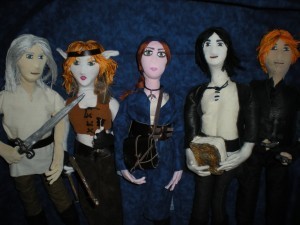
Personally? I think these are pretty awesome. Especially Asper's very serious doll-face. You can tell she is probably not messing around right now!
In my utmost appreciation to Tiffany, I will be sending out a pair of signed books to her for her unwavering efforts. While I can't always promise the same for anyone who sends me in fan-made stuff, trust me when I say that I love all things fan art and wholeheartedly encourage you to send them in so I can put them up!
November 15, 2011
Genderesque
I have no idea what it is about art that makes us feel we need to label it.
Well, that's not entirely true. I have some idea. I acknowledge, certainly, our need to understand and discuss art and, certainly, were we to simply look at a book or a painting and go "yeah, that's art, all right" and say nothing more about it, then the only reason to take art history courses would be to see naked cherubs. Heck, I can even acknowledge the benefit of genre labels as a useful direction (though I maintain that you'd be foolish to use one as a template).
What I don't get, really, is an obsession with the implications behind the labels.
I happened to be listening to NPR on my way home from a workout and happened to listen to a book review on my way there. I was only half-listening at that point, mind, since I find that NPR's critics tend to speak in a way that inspires a flight-or-fight type response that usually translates to sleep-or-brick response (and as such, I can't quite remember the name of the book, apologies to the author and to NPR), and since I didn't happen to have a brick on hand, I was far more attentive to the sweat-laden need to consume poultry. I only really started paying attention when the phrase "this is such a boy book" was uttered.
That gave me pause for a number of reasons.
Of course, it instantly seized my attention as a man who has, occasionally, been suggested to be a writer of "boy books." I don't take this as a criticism, of course; I'm perfectly happy if men enjoy reading my books. Many of my favorite books have also been written by men. Many by women, as well. Which brings me to the second reason I paused: what, exactly, is a boy book?
I mean, I can certainly infer the definition. A boy book is a book that deals with habits or subjects that would appeal to boys. Violence, action, bloodshed, bodily functions or, in the case of this book, thinking about thinking. These are things that appeal to many young men, of course, they could rightly be considered to be subjects that would attract the attention of boys.
The thing is, I don't know if those subjects are as solidly embroiled in testosterone as they once were, especially when one writes genre. And I don't think it's just boys that consider them worthwhile.
If you pay attention to book discussions at all, you're probably aware of how much emphasis is put on appealing to women readers. It's apparently a tremendous shock to a lot of publishers that many women are given to intellectual pursuits and in possession of their own income. Regardless, a great deal of fuss is made over the necessity of appealing to women, presumably by writing "girl books" or subjects that appeal to girls. Which are…what? Love? Kittens? Relationships? Character interactions? Rainbows?
The reason I used so many question marks is because, frankly, I'm not sure what appeals to women. And the reason I'm not sure is because I don't think there is a set list of items emblazoned in bold lettering hanging on the wall in the halls of some cold authority on what art touches with the header: "THINGS APPRECIATED BY THE HUMAN FEMALE." Admittedly, I'm certain that character relationships, interactions (and possibly kittens) are important to women. As I'm certain that bloodshed, action and farts are also important to women.
And this is kind of my point.
Whenever I get a message of praise, it's only very rarely along the lines of "I LIKE THAT THERE BLOOD SPATTER WHAT YE DID ON PAGE 25″ or "I LOVED THAT JOKE ABOUT NEEDING PANTS" (though, for the sake of intrigue, it's worth noting that both the times I've gotten those, they've been from very lovely ladies) and more often along the lines of appreciation for the character interactions, love for the relationships and a desperate hope that Lenk and Kataria end up together (again, for the sake of intrigue, a good number of those requests have been from gentlemen).
"Boy book" and "girl book" are, in my mind, slightly less than relevant terms. Not because boys and girls aren't different and we're all just secretly some gray, androgynous people sans genitals known as "The Muppatos" (I'm pretty sure I only dreamed that), but because it's getting harder and harder to define exactly what a boy will like that a girl won't and what a girl will like that a boy won't. This goes double for writing in genre, since geek culture tends to be fairly egalitarian and has heroes and heroines in plenty. But more than that, we're slowly inching to the point where genre lines–and indeed, most qualifiers–have ceased to become merely blurry and are now becoming as indistinct and intangible as the border between Muppattonia and Badgerville. And those places don't even exist.
It's worth praising George R.R. Martin for pushing fantasy away from exercises in world-building and myth-making and into character-driven stories. But no one seems to acknowledge the worth that urban fantasists put forth in doing the same. It's far too easy to say that urban fantasy exploded because women suddenly found a lot of money and time. The fact is that it's not at all a coincidence that stories focusing primarily on character interactions, development, conflict and relationships tended to be what people in general wanted to read.
And yet, I'm not saying a lot of new stuff here, am I? Yes, gender stereotyping is bad. Yes, they're harder to define. No, you shouldn't write a book that completely alienates women or men. This is all rather rehashed stuff and truthfully, the primary concern doesn't have a lot to do with women or their purchasing power. Rather, I think the problem lies a lot with how boys are portrayed in the eyes of media.
My good friends at the Book Smugglers once brought up a very good point about how a lot of boys are taught to "fear the feminine." That liking character development or wondering if two people are going to get together somehow makes you less worthy as a male than, say, enjoying blood and guts. It's not an unworthy theory, really. I'm not of the opinion that a lot of the books being written today are specifically for women so much as I think that there's a lot of discouragement for men to read them.
I can't quite say who pushes this (it is, after all, a combination of a lot of things from culture to media to your cousin who calls you a tool for watching Thundercats even though it's totally unique and fresh and Panthro now has very real human and emotional problems so you can just SHUT UP, STEPHEN). Maybe it's a failing of those who advertise such things as to suggest that there are boy books and there are girl books and never the two shall meet. Maybe it's that people prefer the gender lines to be clear cut and in the sand. Or maybe I'm totally wrong and boys really don't read as much.
But I don't think we do ourselves a tremendous amount of good by so easily labeling ourselves to the exclusion of the other gender. Nor do I think we give ourselves a good reason to read something that puts us outside our comfort zone if we so easily brand it as "not for you, boy/girl, go read something girl/boy." What I do think is we should be as daring in our encouragement of others' reading as we are in our own.
I also think Thundercats is awesome.
November 8, 2011
My Cold Electric Heart
So, by the time you read this, Black Halo, the second book in the Aeons' Gate trilogy, will be out on Kindle, after far too many months of existing in that bleak, horrifying electric limbo where the Virtual Boy and Mavis Beacon have gone to die. Mind that you don't keep that information too close to your heart. If you happen to say Mavis Beacon's name three times, she comes out of your computer screen and carves typography lectures into your flesh with a nail file.
If you're reading this a week later than the day it's been published, or if you are a time traveler (and if you are, you should shoot me your personal contact info. Me and the rest of the H.M.T.T. are getting together to assassinate Hitler next week), it will also be out on Nook.
…that's pretty much all I wanted to say, but it feels like there should be more. The eBook, after all, is distinctly and unpleasantly late in coming. It physically wounded me to have to say "soonish," when people asked me where it was, and not just because they frequently beat me with their Kindles afterward. I know my editor, Lou Anders, and I actually got drunk on occasion and decided to go down there and give them a piece of our minds. But then we realized we were in Georgia and that was going to take a long time to get there, so we just hassled a guy dressed like an ewok.
…that guy was a real ass, though. He had it coming.
Regardless, there's not a lot I can say. Circumstances conspired unduly and left no one involved in the production of it happy about when it came out. It feels as though I should apologize for it taking so long, but I can't see that accomplishing much. It certainly was no matter of sloth, neglect or malice that made it out so late. Certainly, both my editor and I wanted it to come out much, much earlier than it did.
All I can really say is that I really hope you've enjoyed it. If you've been waiting for it to come out on eBook, I'm glad it's there for you. If you were rightfully impatient and bought the paperback, then I'm forever in love with you. Let's run away and live on a desert island and harvest monkeys for the rest of our days, it'll be just you, me and Mavis Beacon.
…wait. Did I just say her name two times or thr
November 2, 2011
Eating the Flesh of Leprechauns
So, to headline stuff quickly: books for the giveaway are going out, sorry I've not been around, this is a tough week for me as I don't really have a shitton of time to do anything but be a pal of pals.
In general, I'm both a fan and not a fan of this time of year. While I utterly adore being busy and I have tremendous fun being at two of my favorite cons of the year, I have one of those weird feelings that time is passing in a blur and not a lot is getting done, like one of those montages where people are getting older and turning to dust as you watch a tree grow up into a beautiful bounty of green apples and then the apples fall and shrivel up into old man balls and then the camera zooms out and they actually are an old man's old man balls and they turn to dust and it pans up and the guy is staring at you and his face is turning to dust and you see a child laughing in the reflection of his dull, rheumy eyes before they turn to dust and there's an aging farmhouse in the background and you're all "what the hell just happened" and your date is all "shut up it's totally artistic" and you're like "no, it's stupid, I wanted to see Lord of the Rings" and she's all "we've watched that movie twelve times" and you're like "which" and she's like "what which?" and you're like "it's a trilogy, Sophie, you have to say which" and she's all "the one with goblin" "who the hell is goblin" "the little goblin" "his name is SMEAGOL, SOPHIE, GOD DAMN IT."
…sorry.
Anyway, I'm back from two different conventions back-to-back, both of which were exceedingly fun but bore a pretty interesting contrast.
I note that, when people who are not published (but have aspirations to be), they generally experience two different fantasies of what it's like.
One is the artist: frequently frustrated, often starving (or at least suffering from poor nutrition), downing cups of coffee as droplets of sweat pour down their furrowed brows to stain the keyboards as trembling, caffeine-laced fingers gingerly type out six words in the span of twelve hours before recoiling with a gasp and looking up at the ceiling to reminisce about how cool it would be to have a really messed-up relationship so you could write about that.
The other is the businessman: the person for whom the term "schmooze" is less of a verb and more of a rare form of martial art, going out to social events with suits and ties and hobnobbing with people who discuss contracts and royalties and say "how's that baby of yours doing anyway, Johnson" as they sip expensive wine and pretend everyone around them is wearing deodorant and titter politely at jokes that colleagues make before quietly talking about how you loathe them so when they turn their backs.
It may be because I used to get beat up by the math club at school, but I've never really had a head for numbers and, subsequently, I've never had a real fantasy for being business-like…businessesque. I don't wear suits, since I don't like owning more than three pairs of trousers at a time. I hate babies. My titters tend to be manly grunting sounds and I think it's dishonest to wait until a person has left to talk about how much you loathe them, so I frequently interrupt people mid-sentence to tell them I hate them.
It's possible I'm doing it wrong.
In summation: I like World Fantasy, but I don't frequently go there to talk business. So I don't have a lot to tell you beyond the fact that these three men are all liars and you should never listen to anything any of them says ever about anything.
I will say this, though: don't fantasize about business.
I can certainly understand the allure. The idea of high-stakes deals, agents in heated negotiations and movie deals flying through the air like paper cranes can be enough to set many people a-quiver. The words "luncheon meeting" can inspire strange and confusing emotions in many people. Indeed, these things may very well happen. Indeed, they may be happening right now.
But it's a dangerous road. Because I find the type of people who fantasize about the business of writing often become obsessed with numbers. They fantasize about the number of lists they'll be on, the number of awards they'll get, the kinds of amazing things that will happen to them once they get published. I think even the most battle-hardened writer thinks about that. I don't think any of us ever stops thinking about that.
The difference between fantasy and reality, though, aside from the disappointing lack of dragons and the ability to solve your problems by stabbing people, is recognition. Specifically, the recognition that careers, especially in this industry, are like rivers. They ebb and flow. They rise, they fall. Some of them become overfished and collapsed. Some just drift away. They may twist alike, but no two ever twist in precisely the same way. The only way to succeed at being a river is to flow the way you want to flow.
Before the torture of that metaphor gets me imprisoned for war crimes, I'll summarize by saying this: no matter how much business gets done, no matter how many luncheon meetings you aspire to have, it will always come down to the art and the art will determine everything you do.
When the art clicks with people, it will create the success. And when the times are difficult, it will be your love of the art that keeps you going. Fantasy is lovely. Ambition is to be applauded. But recognize what you can and cannot affect. You can't affect how the future will play out. You can affect what you write and what you continue to write. That's the kind of fantasy you can thrive on.
I'd go further, but I think anything else at this point can only be said if I were a big lion floating in the clouds.
And you're no goddamn Simba.
Sam Sykes's Blog
- Sam Sykes's profile
- 1214 followers


